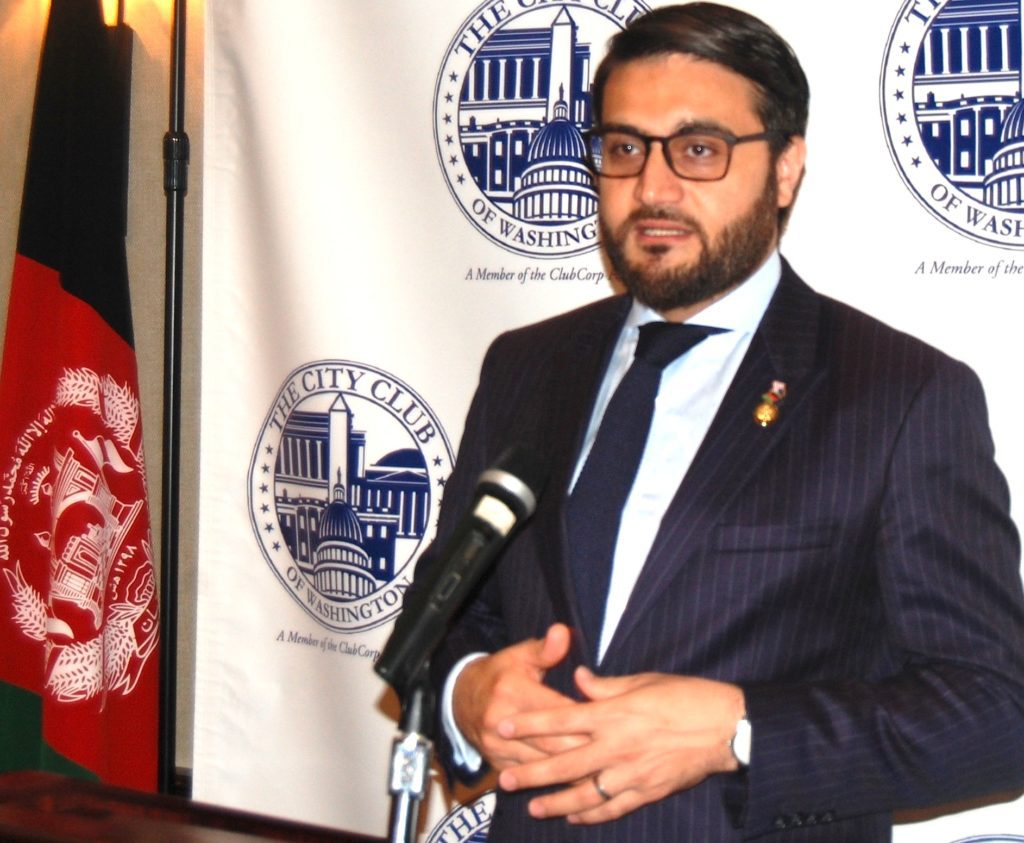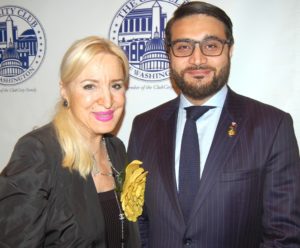Ambassador: Afghan Dream, American Dream, No Different
By • July 17, 2017 0 519

The education of children was at the center of a talk by Afghanistan Ambassador Hamdullah Mohib at a Sister Cities luncheon at the City Club July 14 — the day before Afghan students arrived in Washington for a robotics competition.
Mohib would later tweet: “Proudest moment of my tenure to see our Afghan Robotics Team lead the #FGC2017.”
He was introduced by Sister Cities board member Christine Warnke, who said, “Mohib embodies the ideals of Sister Cities,” which advocates people-to-people diplomacy.
Proud of his country’s participation in the robotics competition, the First Global Robotics Challenge, Mohib thanked the White House for easing visa restrictions for the girls, who were twice denied visas to travel to the U.S.
Having lived in a refugee camp, Mohib later worked at Intel and supported the candidacy of Afghanistan’s President Ashraf Ghani.
Mindful of the seemingly perpetual war, Mohib said that there are 20 terrorists groups in the beleaguered nation. Nevertheless, he said,”There is a cadre of professionals who invest in the education of children. Today, 40 percent of the students in Afghanistan are female.”
Programs like Sister Cities go deeper with its citizen diplomacy, said Mohib, who added that participation in diplomacy by ordinary people is crucial. “Politicians will destroy the world,” he said.
On women’s progress, Mohib said there was “irreversible progress for women in Afghanistan,” noting that there were more women in the Afghan parliament than in the U.S. Congress. He cited women’s increasing role in high tech — saying, “they have the code to inspire” — and their role, mostly behind the scenes, in media.
Among those in attendance at the lunch was former Rep. Jim Moran (D-Virginia), who asked about the resurgence of the Taliban, which ran Afghanistan before the U.S. attacked the nation because of its ties to the 9/11 attacks. The U.S. remains there for what is now the longest war in its history.
Mohib spoke of the “global network of terrorists that includes neighboring countries” and how some of them will never be reconcilable. “There are criminal and foreign fighters using the instability of Afghanistan … and there are proxies used by Pakistan or Iran.”
Asked about his vision of his country’s future, Mohib said many persons simply wish “to be able to die in their beds.” His wish is to “have people move freely and live the life they want.”
Mohib said the Afghan dream is not different from the American dream. Both Americans and Afghans are people of faith and family, he said.
Some Americans may view U.S. politics as partisan or ugly, Mohib said, but outside the U.S. the world still sees the U.S. as beautiful. “You have lawyers who go to airports because of the travel ban” — and parts of the government that helped the Afghan robotics team, now in competition at D.A.R. Constitution Hall.

Christine Warnke of Sister Cities and Afghan Ambassador Hamdullah Mohib at Sister Cities talk at the City Club of Washington July 14.

